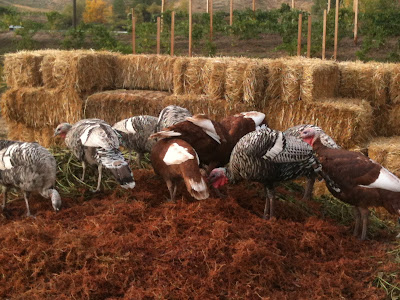 |
Turkeys at the 63rd Street Farm
|
Locavore is a term that has been around for decades but has recently gained popularity. The basic idea is that a locavore eats mostly (if not all) food from a 100 mile radius (or more) from home. However you choose to define it, a locavore is someone who makes an effort to understand where their food is coming from, and the effect that has on nutrition, the economy, their community, and the environment.
Not sure where to start your locavore journey? There are may ways to incorporate locavore values into your diet. Here are some ideas adapted from the Locavore Network:
- Read Animal, Vegetable, Miracle by Barbara Kingsolver. It's the most amazing, inspiring book. You may just drop what you're doing and head out to start a farm. It's the story of her family's movement back to the land, and back to their food. They grow tomatoes and raise turkeys and get to know the neighbors. This book will fill up your heart, and remind you that packaged/processed/anonymous food is not the only way. Barbara writes, "And I refused to believe a fuel-driven food industry was the only hand that could feed my family. It felt good to be right about that."
- Decide what "local" means to you. It could be your city, your county, your state, or multi-state region. Maybe you include one local ingredient per meal, or maybe your whole meal is local. The most important thing is to make this sustainable for your family.
- Check out your local Farmers' Markets. Some of you might even be lucky to have a market that runs year round. Talk to the vendors and ask what's in season and what's coming soon. They can also tell you if they have a farm stand at a different location where you can purchase produce and meat at different times during the week.
- Go ahead and start a conversation with those nice folks who work in your grocery store. Ask questions about where the food comes from. Let them know that local is important to you. This is especially effective at the smaller locally owned stores. (Note: They're not a locally owned store, but Whole Foods has lots of great local meat. They can always tell you where it comes from, and the best days to come in for certain items!)
- Join a CSA. Although the idea has been around for decades, CSA (community-supported agriculture) farms seem to be popping up like crazy lately. You purchase a CSA share at the beginning of the growing season, and when the harvest begins you get to pick up your share of produce every week. Our CSA farm also sells eggs, meat, local wine, and other local goodies at the pick-up every week. You get to know your farmer and you get to know your food.
- Eat out! More and more restaurants are including local produce, meats, and cheeses on their menus. Support these restaurants and let them know you appreciate their participation in local agriculture.
- Plant a garden. Whether you have acres or just a small window box, grow something. Veggies and herbs ALWAYS taste better when you've grown them yourself.
- Preserve the bounty. Can, freeze, or dry produce to keep it through the winter. I'm fortunate to have a husband who cans tomatoes. I can't tell you how good a bowl of homemade tomato soup tastes on a cold winter evening. In case you don't have a handsome man who cans veggies hanging around your house, many local rec centers and continuing ed programs have canning/preserving classes.
I'd love to know how you incorporate locavore living into your life. Please share!
No comments:
Post a Comment